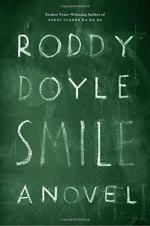|
This section contains 630 words (approx. 2 pages at 400 words per page) |

|
Smile: A Novel Summary & Study Guide Description
Smile: A Novel Summary & Study Guide includes comprehensive information and analysis to help you understand the book. This study guide contains the following sections:
This detailed literature summary also contains Quotes and a Free Quiz on Smile: A Novel by Roddy Doyle.
The following version of this book was used to create this study guide: Doyle, Roddy. Smile. Viking, 2017.
Victor Forde has recently moved back to his hometown after a divorce from his famous chef wife, Rachel. Victor, an unsuccessful writer, feels like even more of a failure after his divorce, and he aims to drown his sorrows at a local pub. At Donnelly’s, the bar near his apartment, he meets an old schoolmate named Eddie Fitzpatrick, who remembers details about their time at school that Victor cannot. In fact, he cannot remember Fitzpatrick at all.
However, Victor starts having flashbacks to both his time at school and his early years with Rachel. He remembers three influential events from his days at St. Martin’s Catholic Boys School. The first was when a French teacher – a Brother – developed a crush on him that embarrassed him and made him ostracized from the other boys. The next was singing in a choir assembled for an old Brother’s funeral – a funeral mass that the Brother attended before his death. The final event was a sexual molestation he experienced at the hands of the Head Brother.
Victor also remembers his life with Rachel, when they were both on their ways to becoming successful. He thinks of how they met when they were both guests on a radio show. He remembers how much sex they had and how free he was with her. He remembers the series of apartments they shared, and how happy he was with her.
At the same time, though, Victor recalls how he started having regular visceral flashbacks to his molestation. He aims to minimize the psychological damage the event had on him, however, by turning it into a joke – that he tells Rachel, his friends, and even on air on the radio. He feels panicked that the Head Brother will hear when he tells the story on air.
In Victor’s present, he continues to dislike Fitzpatrick, who seems to always be at the bar when Victor is there. Victor is making friends, though, with normal, likeable guys he feels could have been his friends if he had stayed in his hometown, instead of uprooting himself to move to Dublin. As his relationships with these other men grow, Victor starts ignoring Fitzpatrick.
As Victor develops friendships with the other men and starts seeing a married woman named Brenda, he becomes more concerned that Fitzpatrick is stalking him. His fears are realized when Fitzpatrick angrily corners him in a grocery, seeming upset that Victor prefers spending time with the other men. Later, after a night with Brenda in his apartment, Victor sees that Fitzpatrick has been hiding behind a curtain, watching their whole interaction.
Fitzpatrick soon reveals himself as Victor. They are the same person. Specifically, Fitzpatrick, who is not really named Fitzpatrick, suggests that he is the other Victor, the person that Victor would have become if he had made other choices. Fitzpatrick makes Victor admit that there was no Rachel, that Victor could not even show up for their first date because he was too afraid to touch her. Victor comes to the realization that he and Fitzpatrick are the same. Ultimately, Victor is made to admit that the Head Brother raped him multiple times; he did not just molest him.
These actions, along with the Head Brother’s cruel statement, shuttered Victor’s life forever, meaning that he could not live the life for which he was destined. This unlived life is the one described – fabricated – by Victor in the novel. This final twist destabilizes the reader’s interpretation of the entire novel, making it impossible to tell which parts of the novel are Victor’s reality and which are part of his fictions.
Read more from the Study Guide
|
This section contains 630 words (approx. 2 pages at 400 words per page) |

|



